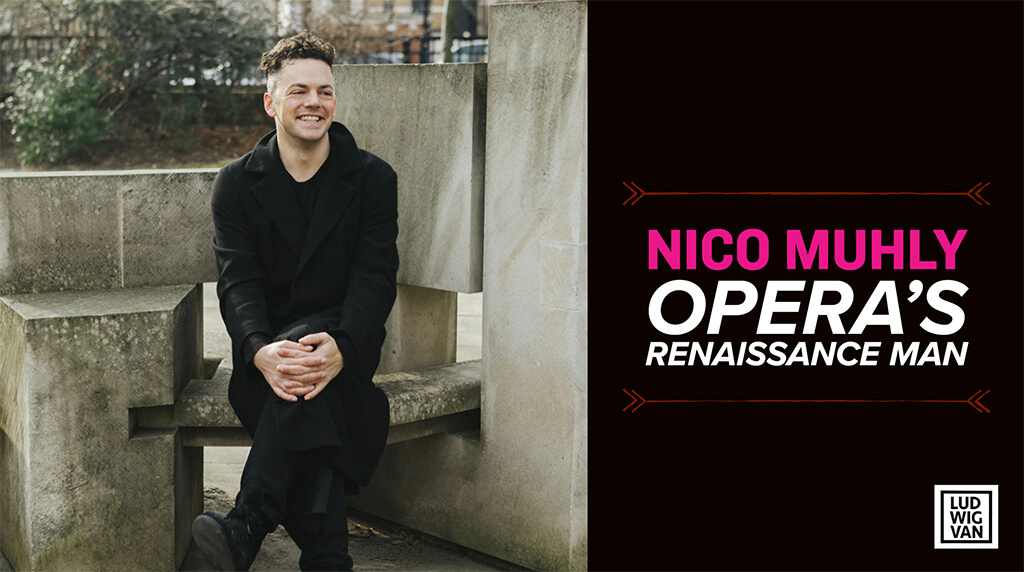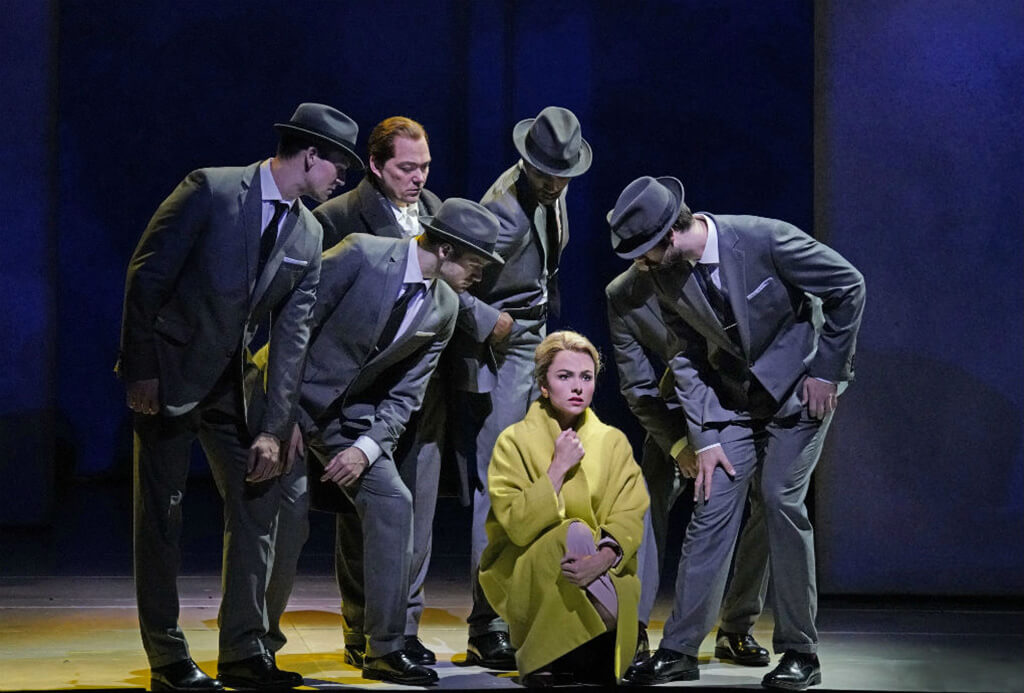
The beauty of Nico Muhly’s job is that he can work from anywhere, as long as it’s a hive of activity.
That’s the appeal of New York City, the 37-year-old composer reveals during our interview. Speaking from his home base in Chinatown, he’s surrounded by manuscript paper covering his cozy studio, and he has poured sparkling water for himself.
“There’s something so satisfying about living somewhere where everyone’s doing what they’re meant to be doing,” Muhly relishes in the efficiency, the bustle and touch of chaos within it all. “One of the things I find so moving about Chinatown is the pace at which basic commerce happens — if I get off the train on my way home, I can buy seventeen different kinds of vegetables and then be home, having spent five dollars and it took, you know, 35 seconds.”
His operas are in demand on all continents, but Muhly is particularly excited of the broadcast partnership of his latest opera, Marnie, that will bring the Metropolitan Opera production to cities across Canada on November 10. Cinema-goers in all 10 provinces will be able to see the performance live at their local Cineplex theatre — in high-definition, no less.
“To have such a huge organization putting their weight behind a piece of contemporary work by a living composer is incredibly moving,” Muhly is hopeful that this will recruit more listeners into the contemporary opera ecosystem.
For a production like Marnie, legacy production roles are still central — the production brings together premier musicians, technicians and designers. “The live culmination in two hours is miraculous,” Muhly says.
Born to artistic parents — a visual artist mother and a filmmaker dad — music came easily to Muhly. “At a certain point, if you do [art] enough you naturally realize you’re good at certain elements of it. And that was the case for me — I sort of latched onto it.
“So much of it is based on my own obsessions — chords that I like and things that make me happy,” he continues. “It’s always quite personal, even when it’s completely abstract music, which is to say, without singers or a text dominating it.”

In a more outspoken world, Muhly sees how opera can carry messages of social change, but he is happy to infuse his own personality into the art first and foremost, especially through the power of words.
“My job as a composer is to try to use the libretto as a jumping-off point for a huge amount of musical expression,” he says. “It feels as if the libretto is a groundwork for a lot of experimentation; a lot of getting it wrong before you get it right.”
Even if he is more accustomed to writing music with text, he does not mean for it to dictate an agenda.
“I’m not interested in saying, ‘I want you the audience to feel this specific way,’” he clarifies. “That to me is kind of a romantic notion of music transporting you on a journey.”
Even if the music carries no lyrics, “if you establish a coherent musical structure, I’ve found the audiences are willing to go with you no matter how twisty or turn-ey the music is.”
Turning to the master composers, Muhly says their influence is unavoidable for any classical musician today. “It’s like family — no matter how distant, you can’t not acknowledge the influence of your relatives…it’s a known structure, like knowing what houses of a specific era looked like: you walk in and you know this is here and that is there.”
For Muhly, music is particularly meaningful when it has a prescribed role, which is what draws him to religious music. “What’s so moving about choral music and church music is that it’s context-specific — there are pieces you only hear one time per year,” he says. “It’s not about virtuosity; it’s not about the composer as artist or hero.”
Muhly acknowledges that his career has been relatively snag-free. “I’ve never perceived myself as running up against limitations, and this comes from the fact that, in terms of my own subject position, I am a middle-class white male.”
He is sympathetic to colleagues who have encountered resistance from society. “The underrepresentation of women composers and composers of colour is crazy — it’s just a question of presenting organizations who — I don’t want to think of as gatekeepers, but as people who have the opportunity to help and equalize things in a better way, should be doing that. And I like to think that’s happening.”
As the United States moves into the second half of a divisive presidency, Muhly chimes in. “If you were a composer of colour, I wouldn’t say it would feel unsafe, but I would argue that there would be massive discomfort in underrepresentation and in tokenism, and in all of the issues that affect communities of colour, about which I can’t possibly know anything.” He encourages those interested to speak directly with other composers — “All I can do is listen about that and help in whatever way I can.”
Nico Muhly’s latest opera, Marnie, will be broadcasted live through Cineplex’s The Met: Live in HD on Saturday, November 10 at 12:55 EST. Encore screenings are happening on Jan 26, 28, 30 and February 17, 2019. Details, here.
- LISZTS | 10 Reasons To Miss A Performance - April 24, 2019
- INTERVIEW | Nico Muhly: Opera’s Renaissance Man - November 8, 2018
- INTERVIEW | How An Iranian Musician Has Created A Revolution In Persian Classical Music - October 7, 2018



